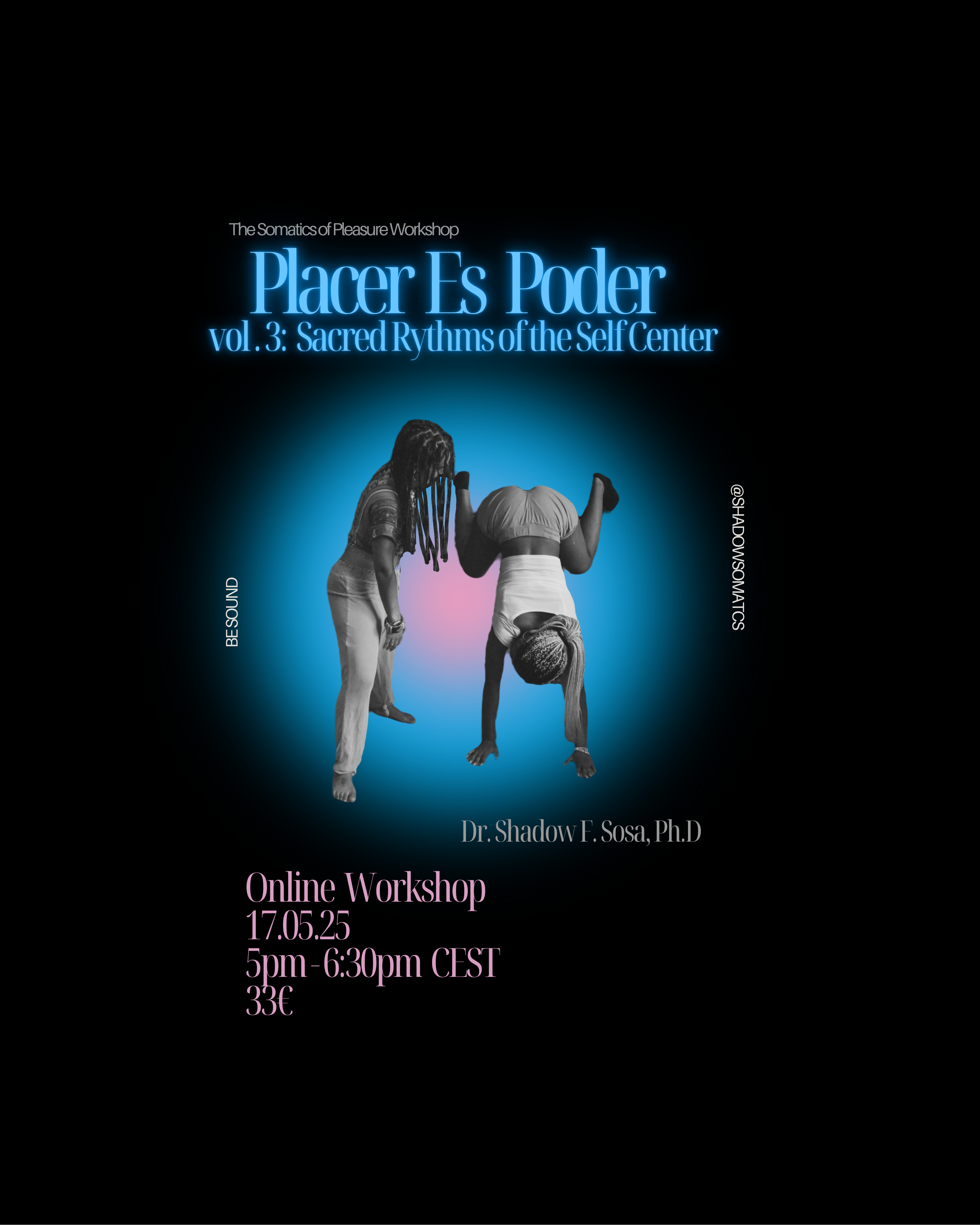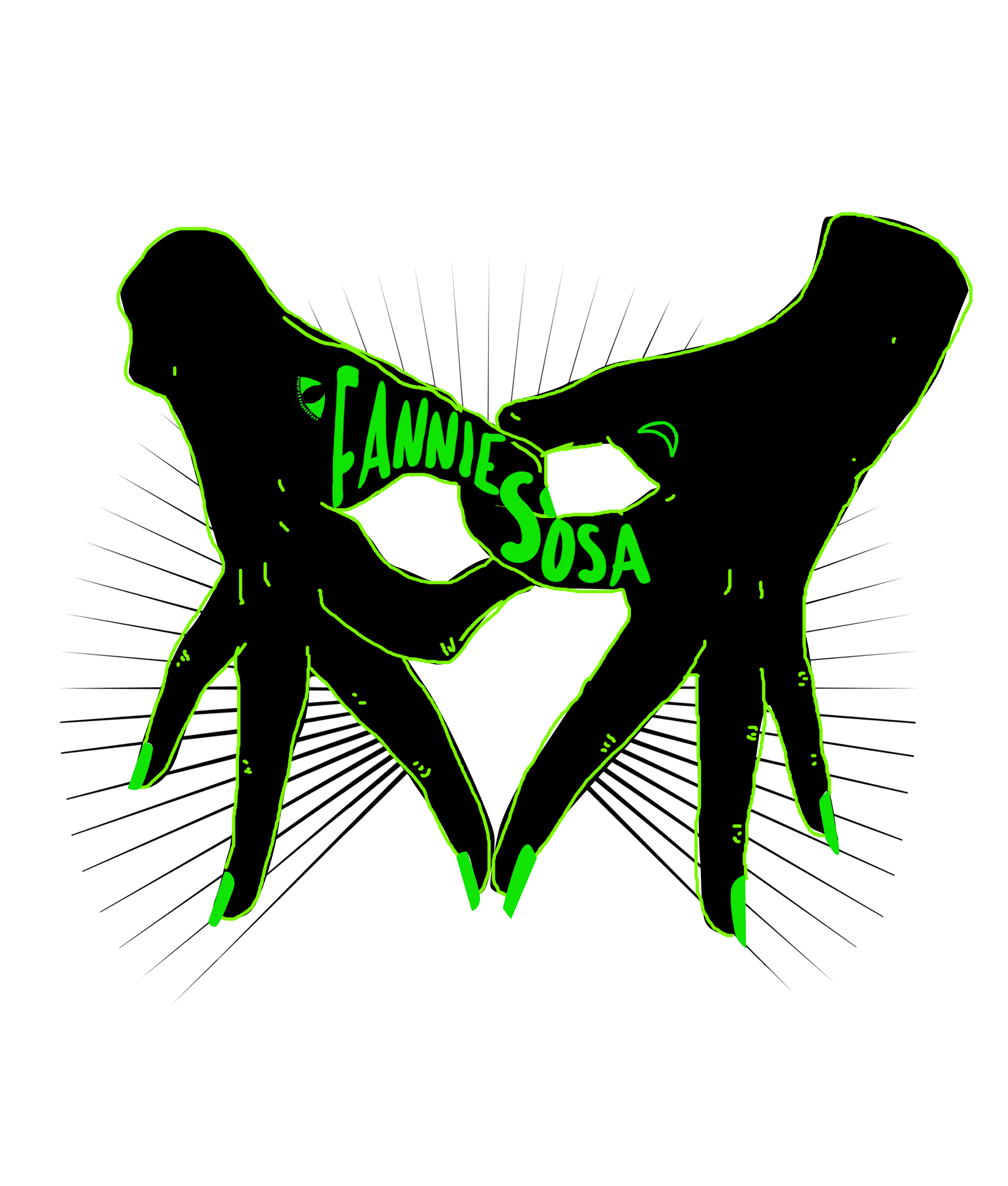
The Somatics of Pleasure Workshop
Throughout the workshop series, participants can expect a
supportive and inclusive environment where they can explore and deepen
their understanding of their bodies. I will be available to provide
guidance, answer questions, and offer modifications to meet individual
needs and goals.
By the end of the workshop series, participants can expect to have a
greater awareness of their hip mobility, enhanced movement capabilities,
and a sense of empowerment to continue their journey towards freedom in
their bodies.
“Sacred Rhythms of the Self-Center” marks the third movement in the ongoing exploration of Sacral Dances through the PLACER ES PODER: The Somatics of Pleasure series. Building on the foundations laid in Vol. 1: Wholeness is a Sacral Dance, where participants began the journey inward to move closer to a state of wholeness, holiness and wholesomeness, and Vol. 2: Embracing Sensuality as Spirituality, which offered tools to experience sensuality as a sacred, integrative force — this installment takes us deeper into the rhythmic intelligence of the body.
The Sacred Rythms of the Black Atlantic offer profound insights into the rhythms that shape our bodies and souls. I chose three musical and movement practices rooted in African diasporic traditions: polyrhythms, call and response, and improvisation. Through these traditions, participants can tap into a rhythmic language that bypasses the mind, allowing them to reconnect with the pulse of their sacral center.
The Self-Center is the sacred core within us all — the place where intuition, creativity, desire, and authenticity converge. In this workshop, we will reconnect with the pelvic bowl, located in the lower belly region, our sacral chakra — the wellspring of our emotional energy, vitality, and power. It is here where the true rhythm of the self resides, and it is from this center that we can begin to understand who we are beyond the expectations placed on us.
In many societies, particularly for women and feminine individuals, the act of centering oneself has often been misunderstood. When we tune into our own rhythm, prioritize our needs, or listen to our inner desires, we are often labeled as “self-centered,” a term historically used to shame us for not being in constant service to others. But this workshop invites you to reclaim that term — to view self-centeredness not as selfishness, but as a revolutionary act of self-preservation and liberation. Embracing the Self-Center means honoring your own sacred rhythms, without guilt or shame, and understanding that by nurturing your own energy, you become more connected and available to others in the most authentic, powerful way possible.
Through this journey of guided movement, rhythm, and sacred dance, you will learn to activate and honor your own inner pulse. This workshop invites you to experience the fullness of your being, tap into the deep well of your creativity, and reclaim your power — for the most sacred relationship is the one we have with ourselves.
1. Kongo Polyrhythms – Flow & Embodiment
Originating from Central Africa and echoed in Afro-Cuban and Afro-Brazilian traditions, these layered, wave-like rhythms invite us into the wisdom of water—fluid, undulating, sensual. In the workshop, they guide juicy stretching and soft, spiraling movements, helping participants melt tension and reconnect with the innate pleasure of the body. These rhythms hold the sacred frequency of emotional release and healing through movement.
2. Call and Response: A Somatic Technology of Connection and Continuity
In the context of Black Atlantic cultural traditions, call and response functions as a core communicative and relational structure — a rhythmic exchange found in music, ritual, labor songs, and communal dance. Anthropologists identify it as a polyvocal system that resists hierarchical modes of expression by emphasizing reciprocity, collective participation, and embodied dialogue. Emerging from West and Central African cosmologies and preserved across the diaspora through syncretic spiritual and cultural forms, call and response is both a sonic archive and a neuromuscular practice. When enacted in movement-based contexts like sacral dance, it activates co-regulation of the nervous system, mirroring pathways, and interpersonal synchrony, creating a physiological experience of being seen, held, and responded to.
In this workshop, we approach call and response as a somatic technology — one that trains the body to listen deeply, initiate authentically, and attune to shared rhythms. Through guided movement dialogues, group vocalizations, and rhythm-based partner practices, participants will explore how this traditional structure can be used to generate a deeper sense of self-awareness, energetic connection, and communal resonance.
3. Improvisation: Ancestral Intelligence and Adaptive Embodiment
Improvisation, within Black Atlantic dance and musical traditions, is not merely spontaneous movement — it is a deeply intelligent, embodied practice rooted in ancestral memory, cultural survival, and neuroplastic adaptation. Anthropologically, improvisation emerges as a strategic response to historical rupture, functioning as both resistance and remembrance. In diasporic communities, it has served to encode identity, communicate emotion, and transmit knowledge across generations, often in contexts where formal systems of expression were denied or suppressed. Improvisation, then, becomes a radical act of presence — one that honors the moment while remaining in dialogue with the past and future.
From a somatic perspective, improvisation activates the pre-motor cortex, engages the sensory-motor loop, and allows the body to reorganize movement patterns in real time, fostering agility, intuition, and emotional regulation. In sacral dance, this opens a space for self-sourced expression — where the dancer becomes both choreographer and vessel, guided by inner sensation, rhythm, and energetic flow.
In this workshop, improvisation is framed as both method and ritual: a practice of tuning into the sacral center to source authentic movement, to trust instinct, and to express without censorship. Participants will explore structures that support spontaneous creation, cultivating the courage to be witnessed in raw, unfiltered motion — where the sacred meets the unpredictable, and the self becomes whole in the act of becoming.
